- Home
- Michael Bond
Monsieur Pamplemousse Rests His Case
Monsieur Pamplemousse Rests His Case Read online
MONSIEUR
PAMPLEMOUSSE
RESTS HIS CASE
Michael Bond
CONTENTS
Title Page
1 HANDS ACROSS THE OCEAN
2 FAMOUS LAST WORDS
3 TROUBLED WATERS
4 DINNER WITH DUMAS
5 THE LONE STRANGER
6 COMINGS AND GOINGS
7 PUTTING OUT THE CREAM
8 THE BALLOON GOES UP
Also by Michael Bond
Copyright
1
HANDS ACROSS THE OCEAN
The Director settled himself comfortably in the leather armchair behind his desk, shuffled a few papers nervously to and fro across the top, carefully covering as he did so a large map of the United States of America, then cleared his throat as he brought both hands together to form a miniature steeple with his fingertips.
Recognising the signs, Monsieur Pamplemousse sought reassurance by giving the top of Pommes Frites’ head a passing pat, then sat back waiting for the worst. He wondered idly if it would be a case of being addressed by his surname or by his Christian name. From the shape of the steeple – high and severely orthodox – he guessed at the former. The Director was wearing his official look: a mixture of barely concealed disapproval and distaste of what he was about to say. He cleared his throat a second time.
‘Pamplemousse, I have no doubt that in your previous occupation – I refer, of course, to your years with the Sûreté – you had need from time to time to consult the Code Napoléon?’
Monsieur Pamplemousse made a non-committal grunt. There had been more than one occasion when he would gladly have seized hold of a copy, preferably a leather-bound edition, and used it in order to batter a particularly belligerent or uncooperative offender into telling the truth, but he sensed it was neither the time nor the place to say so.
‘Good.’ The Director picked up a sheet of paper. ‘That makes my task easier. I would like, if I may, to draw your attention to Article 1101: the definition of a contract.
‘It states, and I quote: “A contract is a convention by which one or several persons commit themselves towards one or several other persons to give, to do, or not to do something.”
‘I’m sure you will agree that the extract I have just read is a masterpiece of construction. The wording is concise – a mere twenty-eight words; the meaning crystal clear and unassailable.’
Seeing that something more than a mere grunt was expected of him, Monsieur Pamplemousse nodded his agreement. There was no point in doing otherwise.
‘I am pleased you agree, Pamplemousse. To carry matters a stage further, in accepting your present post as an Inspector with Le Guide, you committed yourself to a contract. Why, then, when I arrived at my office this morning, did I find a letter of resignation on my desk? I have, of course, torn it up, but I think I deserve an explanation.’
‘The answer is perfectly simple, Monsieur. It was in response to your memo of yesterday’s date asking me to stand by for further instructions. By the merest chance I happened to be passing the Operations Room and when I went inside I saw where they had put my flag. Not, as I had every good reason to expect, in the Section Vacances, but lying on its side in the pending tray. The staff were unusually evasive and I began putting two and two together. It did not take me long to come up with an answer. One which, if I may say so, is certainly not covered by the Code Napoléon.’
The Director made a clucking noise. ‘My dear Pamplemousse, everything is covered by the Code Napoléon. If it is not in the Code Napoléon, then it does not exist. In their wisdom, its authors made sure the document covered every conceivable eventuality; from the laws which govern our country, to the way one should behave when visiting a public garden; from the manner in which letters should be written – the various forms of address and the correct phrasing of salutations, down to the time it should take a concierge to clean her front door-step.’
He rose to his feet, went to the window, and gazed out across the esplanade towards the Hôtel des Invalides and the vast golden dome which protected its illustrious occupant from the elements.
‘Were he alive today, Pamplemousse, the Emperor would not be best pleased. If one believed in such things, one might hazard a guess that he is at this very moment turning in his tomb, thus causing consternation among those tourists from all over the world who have tendered good money in order to pay their respects.’
‘With equal respect, Monsieur, were he alive today and in my shoes I think he would have good reason to be restive. The Emperor Napoléon may have covered every eventuality which he could possibly have foreseen at that period in history, but times change. Had he been born a century and a half later, and had he found himself working for Le Guide, he could well have had second thoughts on the subject; he might even have toyed with the idea of introducing a possible escape clause to Article 1101; an “insofar as” perhaps, or even a simple phrase like sauf exceptions – “with certain exceptions”; par exemple, requests beyond the call of duty, particularly if it been his understanding that he was about to enjoy a well-deserved holiday with the Empress Joséphine.’
The Director heaved a sigh and turned away from the window. Clearly, as he crossed to his drinks cupboard and removed a bottle from the ice-bucket he was preparing himself for another form of attack; a diversionary move of some kind aimed at lulling his adversary into a false sense of security prior to a sudden flanking movement.
A brief glimpse of the label confirmed Monsieur Pamplemousse’s suspicions. The Chief must have been expecting trouble, otherwise why would he have had a bottle of Gosset champagne chilled and at the ready when his normal preference was for Louis Roederer? The answer was simple. He knew the tastes of his staff.
‘Come, come, Aristide … you must not take too narrow a view of life. There are wider horizons than the one which can be seen from this window, or even from wherever it was you and Madame Pamplemousse intended spending your holiday together. Horizons which have much to offer. It is my belief that if Le Guide is to flourish and prepare itself for entering the twenty-first century we cannot afford to stand still. We must lay the foundation stones for the future, and we must lay them now. The recent computerisation was but a first step. Now that that particular mountain has been successfully conquered, we must put our facilities and our expertise to good use. We must expand into other areas. In particular we must look towards the New World. I am sure it is what our founder, Monsieur Hippolyte Duval, would have wished.’
The Director diverted his attention momentarily towards a painting which occupied a goodly portion of the wall above his head. Following the direction of the other’s gaze, Monsieur Pamplemousse couldn’t help but reflect that its principal subject, depicted by the artist toying with a bowl of moules marinières outside a country inn, might not have looked quite so relaxed had the river which formed the background to the picture been the Hudson rather than the Marne. By all accounts he might have felt the need to keep a more watchful eye on his bicycle, chaining it to a convenient fire hydrant for a start, instead of leaving it unattended against a nearby tree.
‘Others have made a stab at it. For several years now Gault-Millau have published a guide to New York – and a very good little book it is too, even though it suffers from their usual inability to avoid the bon mot at other people’s expense. But no one on this side of the Atlantique, not even Michelin, has attempted a gastronomic guide to the whole country. It is an enormous, a mind-boggling task …’
Monsieur Pamplemousse half rose from his seat. He didn’t like the turn the conversation was taking. ‘You are surely not suggesting, Monsieur, that I should move to America? Madame Pamplemousse
would never agree to it. As for Pommes Frites …’
Hearing his name mentioned, Pommes Frites opened one bloodshot eye and fastened it unblinkingly on the figure hovering by the drinks cabinet. It signalled his agreement in no uncertain manner to whatever point his master might be making.
‘No, no, Aristide, of course not.’ The Director made haste to relieve his audience of any possible misunderstanding. ‘I am merely looking into the future – the very distant future. For the moment we must content ourselves with exploring the possibilities. To that end, while I was in New York recently I made contact with the publisher of an up and coming gourmet magazine – a Mrs Van Dorman. She is a charming lady, but I suspect life in the Big Apple has passed her by to some extent. She has already carved out one successful career in the perfume business. Now she finds herself heading a publishing conglomerate which has set its sights on Europe.
‘We established a certain rapport, the upshot of which is that she has given me a long list of establishments in the USA which could well form the basis of a guide, and in return I promised her that if she was ever in this country and in need of help I would be happy to reciprocate to the best of my ability. That moment has arrived, Pamplemousse; rather sooner than expected I have to admit – it is only a matter of weeks since we first discussed the matter – but a promise is a promise and I must do my best to slot her in.’
Monsieur Pamplemousse winced. Ever since he had arrived back from America, the Director – normally a staunch upholder of all that was sacred in the French language – had taken to peppering his speech with words and phrases which would have caused even the most catholic member of the Académie Française to reel back in horror had they been present. ‘Slotting things in’ was the least of his transgressions. Ideas had become ‘creative concepts’, and ‘potentials’ were constantly being ‘maximised’.
‘It is her first visit to Europe and I can think of no one better qualified to act as her guide and mentor while she is in La Belle France than your good self. I would take on the task myself, but alas …’ The Director raised his hands in despair. ‘It is one of the problems of going away, Aristide. There are a thousand things to catch up on … planning next year’s edition of Le Guide … making sure those who qualify receive their annual increments.’ He paused for a moment. ‘I believe your own salary comes up for review quite soon …’
Monsieur Pamplemousse stared at the Director’s reflection in the mirrored interior of the cupboard. At least he had the grace to concentrate on the task in hand – the removal of the cork, silently and expertly, and the pouring of the champagne, tasks which kept his head bowed, thus enabling him to avoid a direct meeting of the eyes.
‘What I am suggesting is surely not so outrageous? It could be a pleasant break from routine.’
‘Madame Pamplemousse will certainly consider it outrageous, Monsieur. She will say I am an Inspector, not a tour guide.
‘And what of the language problem?’
‘Mrs Van Dorman has a little French, I believe. Enough. Besides, it does not seem to have hampered you in the past. What you cannot put into words you manage to convey all too successfully by whatever other means are at your disposal. What was the name of that English woman in the Hautes Pyrénées? Madame Cosgrove? As I recall, inhibitions were somewhat thrown to the wind on that occasion; lack of a common language did not prove to be an insurmountable barrier.’
Monsieur Pamplemousse chose to ignore the remark. Instead he tried another tack.
‘I have to take my car into a blacksmith for a major repair, Monsieur.’
‘A blacksmith, Pamplemousse?’
‘I am having trouble with one of the doors. It has to do with the hinges. As you know, it is an early deux chevaux and the particular part is in short supply. I have been teaching Madame Pamplemousse to drive and it is not easy. We had an encounter with a camion in the rue Marcadet. As you may know, it is a one-way street. Unfortunately we were travelling in the wrong direction …’
‘Why is it, Pamplemousse, that whenever you don’t wish to go somewhere there is always trouble with your car? I sometimes suspect you use it as an excuse. It’s high time you either bought a new one or made use of a company car like everyone else. Anyway, it will have to wait.’
‘I did promise Doucette I would try and slot her in for another lesson this week in preparation for our holiday, Monsieur.’
The Director eyed him suspiciously as he returned to his chair. He placed two long-stemmed glasses on the desk, motioning Monsieur Pamplemousse to help himself.
‘Many people would consider my proposal a signal honour, Aristide. But perhaps I haven’t explained myself sufficiently well.’
Drinking deeply from his glass, he uncovered the map and set about the task of unfolding it. ‘America is a large country; a land of boundless opportunity.
‘So far I have only tasted the delights of La Grande Pomme, but I cannot wait to savour other areas. New York is an exciting city, of course: a mixture of extremes. There are undercurrents which are hard to put a finger on, let alone explain. But in the same way that Paris cannot be called France, neither is New York the be all and end all of the New World. Amérique du Nord isn’t all hamburgers with French fries on the side …’
‘I understand they also have frankfurters, Monsieur … and doughnuts.’
‘Don’t be so chauvinistic, Pamplemousse. It is unworthy of you. It ignores the fact that they also have homards from Maine, red snappers from the Gulf of Mexico, crayfish from Louisiana, salmon from Oregon, prawns from Monterey, suckling pigs from Amador County, beef from Texas, and wines from the Napa Valley … the list is endless.
‘They also, I may say, possess boundless enthusiasm for whatever project they happen to be involved in; a quality many of us would do well to emulate.’ The Director paused in order to allow the implied criticism time to reach its target and sink in.
‘Currently, Pamplemousse, as I am sure you know, there is a fashion in certain gastronomic circles for recreating some of the great meals of the past – both in fact and fiction. The worst excesses of nouvelle cuisine are now behind us and people are turning to their history books.
‘I understand there is a restaurant in London which has recreated on more than one occasion the meal on which the film Babette’s Feast was based. I, myself, was lucky enough to be present only recently at a very grand occasion in the Bois de Boulogne when a whole bevy of chefs, Robuchon, Lenôtre, Dutournier, and others, prepared a Pre-Revolutionary Banquet at the behest of one of the great Champagne houses.
‘But when it comes to the grand gesture, the kind of function where money is no object, then one has to hand it to our friends on the other side of the Atlantic. In order to achieve their objective the question of money doesn’t arise. In 1973 the Culinary Institute of America held a feast commemorating Sherlock Holmes at which a hundred guests sat down to a feast of some thirteen courses culled from the works of Conan Doyle.
‘It is a quest of this nature which brings Mrs Van Dorman to our shores and she has sought my advice. She is acting as escort to a group of American crime writers who have a particular interest in culinary matters. They are members of a very élite society – Le Cercle de Six. They meet only once a year and on each occasion they choose a different venue.
‘Last year it was Death Row in Alcatraz. The year before that they diced with the possibility of their own demise by eating fugu fish in Tokyo. This time it is the turn of Vichy.’
‘Vichy?’ Monsieur Pamplemousse looked at his chief in surprise.
‘That seems a very odd choice, Monsieur. With all due respect to the chefs of that estimable city, some of whom have a place in Le Guide, I do not recall Stock Pots lying thick on the ground. People usually go there for the waters. They are more concerned with not eating rather than the reverse.’
‘The good chefs of Vichy may well surprise us, Aristide. It could be that they will seize the opportunity with both hands. Think what it must be like to spend one’s
life cooking for people whose main preoccupation lies in the contemplation of their liver. How they must long to be able to tear up their calorie charts, throw caution to the wind, add a little extra cream here, another slab of beurre there, and indulge themselves just for once …’
‘Nevertheless, Monsieur, it is not a place one would normally choose for a gastronomic extravaganza.’
The Director made a clucking noise. ‘Not all the establishments in Vichy are like the Merveilleux, Aristide.’
Monsieur Pamplemousse gave a start. In all the time he had been working for Le Guide it was the first occasion on which the Director had dropped so much as a hint that he might have been involved in something that had happened soon after he’d joined: a kind of initiation ceremony.
The Merveilleux had been one of his first ports of call. He’d been sent there in order to determine whether or not the hotel restaurant was suitable Stock Pot material – the award given by Le Guide when the cuisine was above average and worthy of a special visit; on a par with Michelin’s rosettes and Gault-Millau’s toques.
The memory of that evening had remained with him for a long time; the hush which had fallen over the other diners when he’d asked for the à la carte menu, only to be told there was no choice. The meal that followed was indelibly etched on his mind – velouté de tapioca followed by carrottes Vichy followed by fruits de saison. Clearly, from the meagre offering of the last course, it had been a bad season for fruit farmers.
Never had he eaten so many grapes at one sitting. In the end the waitress had taken the bowl away from him. And never had he felt so lonely.
Sleep had eluded him that night, as it had Pommes Frites, who was convinced he had done something wrong and was being punished; a conviction which wasn’t helped through his having drunk too deeply of the local water, losing his voice as a result.
Monsieur Pamplemousse had got his own back by writing a report eulogising in great depth on his meal, fabricating a story which involved a change of ownership and a young chef destined for stardom. Another Inspector had been dispatched post haste, and from that moment on, although the Director had never referred to the matter, he had been accepted as part of the team.

 Paddington on Top
Paddington on Top Paddington Takes the Test
Paddington Takes the Test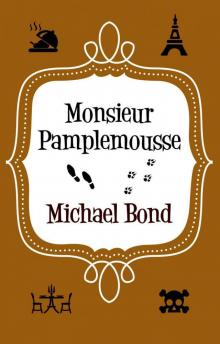 Monsieur Pamplemousse (Monsieur Pamplemousse Series)
Monsieur Pamplemousse (Monsieur Pamplemousse Series) Paddington Here and Now
Paddington Here and Now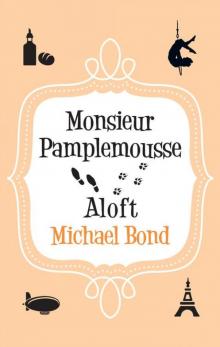 Monsieur Pamplemousse Aloft
Monsieur Pamplemousse Aloft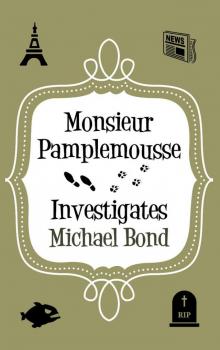 Monsieur Pamplemousse Investigates
Monsieur Pamplemousse Investigates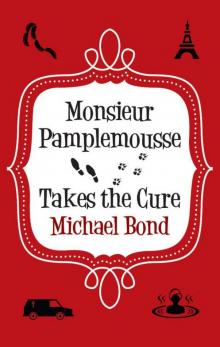 Monsieur Pamplemousse Takes the Cure
Monsieur Pamplemousse Takes the Cure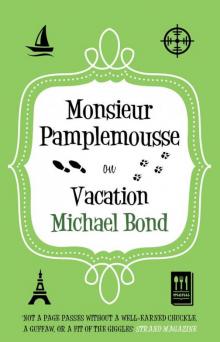 Monsieur Pamplemousse on Vacation
Monsieur Pamplemousse on Vacation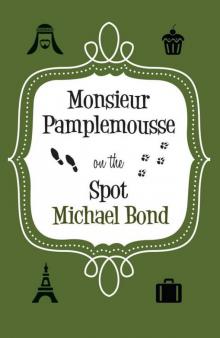 Monsieur Pamplemousse on the Spot
Monsieur Pamplemousse on the Spot Monsieur Pamplemousse Hits the Headlines
Monsieur Pamplemousse Hits the Headlines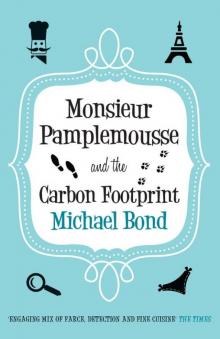 Monsieur Pamplemousse and the Carbon Footprint
Monsieur Pamplemousse and the Carbon Footprint Love from Paddington
Love from Paddington Paddington’s Finest Hour
Paddington’s Finest Hour Paddington Complete Novels
Paddington Complete Novels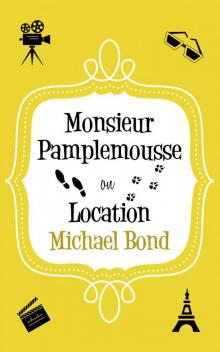 Monsieur Pamplemousse On Location
Monsieur Pamplemousse On Location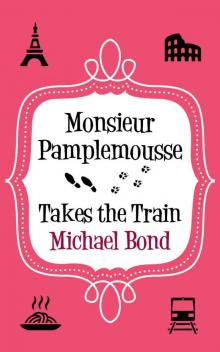 Monsieur Pamplemousse Takes the Train
Monsieur Pamplemousse Takes the Train It Wasn’t Me!
It Wasn’t Me! Paddington Races Ahead
Paddington Races Ahead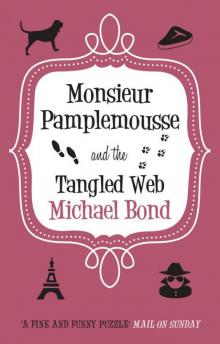 Monsieur Pamplemousse and the Tangled Web
Monsieur Pamplemousse and the Tangled Web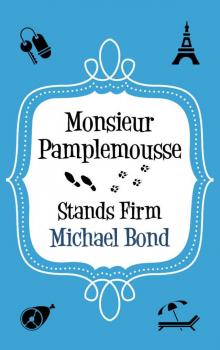 Monsieur Pamplemousse Stands Firm
Monsieur Pamplemousse Stands Firm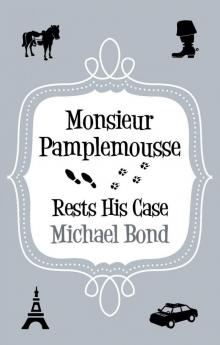 Monsieur Pamplemousse Rests His Case
Monsieur Pamplemousse Rests His Case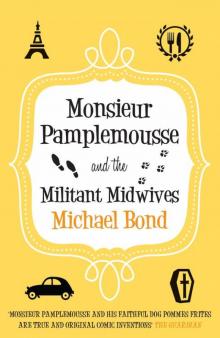 Monsieur Pamplemousse and the Militant Midwives
Monsieur Pamplemousse and the Militant Midwives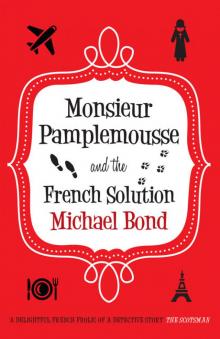 Monsieur Pamplemousse and the French Solution
Monsieur Pamplemousse and the French Solution Paddington Helps Out
Paddington Helps Out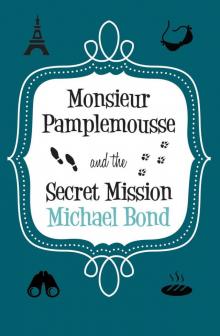 Monsieur Pamplemousse & the Secret Mission (Monsieur Pamplemousse Series)
Monsieur Pamplemousse & the Secret Mission (Monsieur Pamplemousse Series)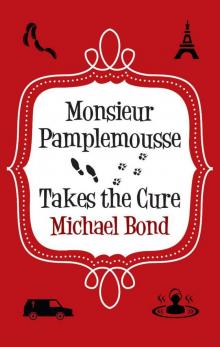 Monsieur Pamplemousse Takes the Cure (Monsieur Pamplemousse Series)
Monsieur Pamplemousse Takes the Cure (Monsieur Pamplemousse Series) A Bear Called Paddington
A Bear Called Paddington